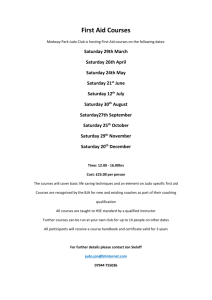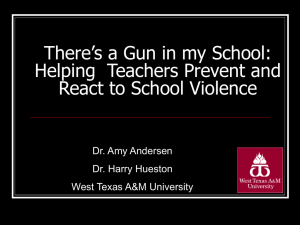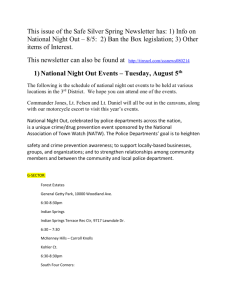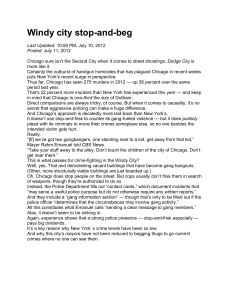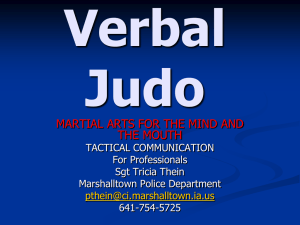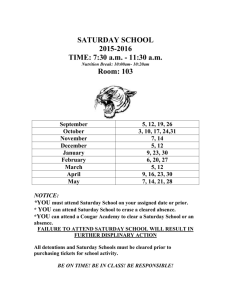2011 Massachusetts VIPS Training Conference Officer Safety Class
advertisement
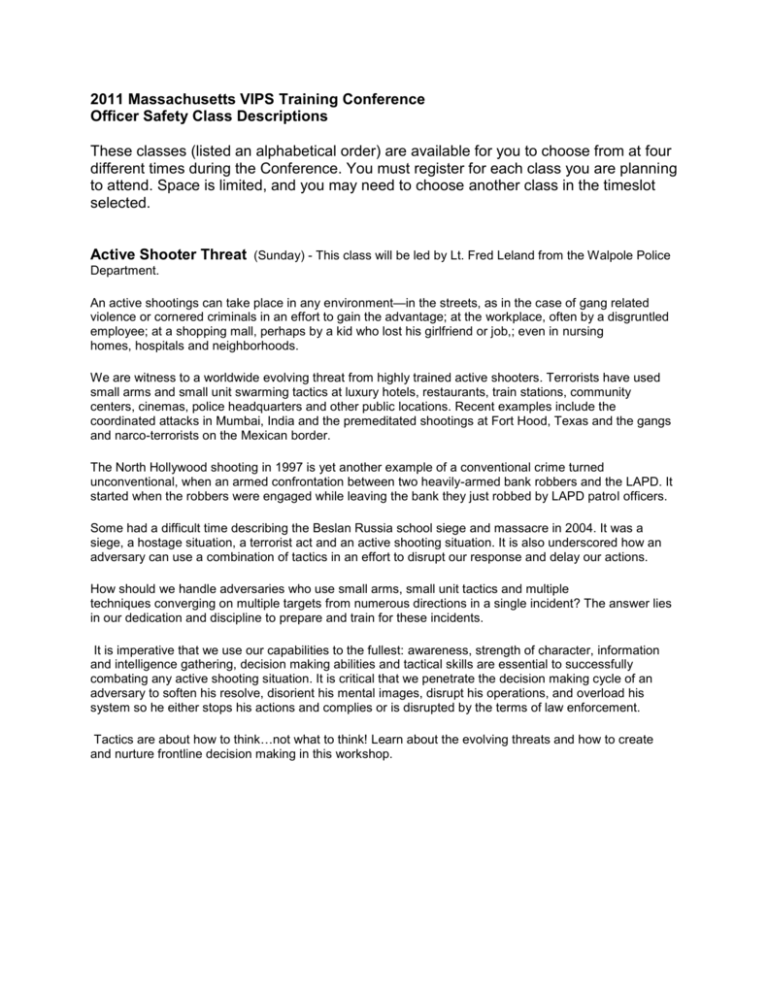
2011 Massachusetts VIPS Training Conference Officer Safety Class Descriptions These classes (listed an alphabetical order) are available for you to choose from at four different times during the Conference. You must register for each class you are planning to attend. Space is limited, and you may need to choose another class in the timeslot selected. Active Shooter Threat (Sunday) - This class will be led by Lt. Fred Leland from the Walpole Police Department. An active shootings can take place in any environment—in the streets, as in the case of gang related violence or cornered criminals in an effort to gain the advantage; at the workplace, often by a disgruntled employee; at a shopping mall, perhaps by a kid who lost his girlfriend or job,; even in nursing homes, hospitals and neighborhoods. We are witness to a worldwide evolving threat from highly trained active shooters. Terrorists have used small arms and small unit swarming tactics at luxury hotels, restaurants, train stations, community centers, cinemas, police headquarters and other public locations. Recent examples include the coordinated attacks in Mumbai, India and the premeditated shootings at Fort Hood, Texas and the gangs and narco-terrorists on the Mexican border. The North Hollywood shooting in 1997 is yet another example of a conventional crime turned unconventional, when an armed confrontation between two heavily-armed bank robbers and the LAPD. It started when the robbers were engaged while leaving the bank they just robbed by LAPD patrol officers. Some had a difficult time describing the Beslan Russia school siege and massacre in 2004. It was a siege, a hostage situation, a terrorist act and an active shooting situation. It is also underscored how an adversary can use a combination of tactics in an effort to disrupt our response and delay our actions. How should we handle adversaries who use small arms, small unit tactics and multiple techniques converging on multiple targets from numerous directions in a single incident? The answer lies in our dedication and discipline to prepare and train for these incidents. It is imperative that we use our capabilities to the fullest: awareness, strength of character, information and intelligence gathering, decision making abilities and tactical skills are essential to successfully combating any active shooting situation. It is critical that we penetrate the decision making cycle of an adversary to soften his resolve, disorient his mental images, disrupt his operations, and overload his system so he either stops his actions and complies or is disrupted by the terms of law enforcement. Tactics are about how to think…not what to think! Learn about the evolving threats and how to create and nurture frontline decision making in this workshop. Defensive Tactics (Saturday and Sunday)- The training will be led by MPTC Defensive Tactics Instructors. These sessions will consist of both classroom and hands on training. The classroom portion on Saturday morning will discuss the latest court rulings in the use of force and will also cover field use of force situations and the related outcomes from a lessons learned perspective. Some time will also be spent for familiarization of T.A.S.E.R. and working an incident when T.A.S.E.R. has been deployed. While this very informative session is highly recommended it is not a pre-requisite to the hands-on sessions. The hands-on sessions will be conducted in the gym and will consist of skills development including hand, baton and cuffing techniques. Bring the following equipment that you may have with you to the hands-on session: Duty Belt, Baton, Handcuffs, and Red Gun. DO NOT BRING FIREARMS, AMMO OR OC SPRAY. You will be required to sign a release of liability form. Firearms Skill Development (Saturday and Sunday) - This training is under the direction of Senior MPTC Firearms Instructors. Pre-Requisite: This class is only open to officers who are currently authorized on-duty carry by their departments. This session will consist of both classroom and hands on training. The classroom training will review the new firearms training program for reserve / intermittent officers, as well as shooting and skill development techniques for the officer. The range portion of the training will consist of live fire range sequences of skill development exercises. You must bring your duty belt with holster, firearm, ballistic vest, eye and ear protection and 150 rounds of ammunition. You will be required to sign a release of liability form. Gang and Drug Activity Update (Saturday) - This class will be led by Massachusetts State Police Sgt. Gregg Nadeau, a member of the State Police Gang Unit. This class will bring you current information on gang activity in Massachusetts, as well as provide you with an awareness of gang culture. Sgt. Nadeau will provide a hard-hitting presentation which examines all facets of the local gang subculture, and provides insight into gang membership. The class will also bring you current information on recent trends in drug activity in the Commonwealth. Officer Created Jeopardy (Saturday) - This class will be led by Lt. Fred Leland from the Walpole Police Department. Officer Created Jeopardy is failure to adapt to changing conditions, due to a false sense of urgency, complacency, emotions, habit, or attributes that stifle insight and innovation. Officer Created Jeopardy stems from lack of knowledge and/or the ability to apply knowledge in a strategic and tactical way to the changing conditions. Considering the factors of Time and Risk! Policies and procedures and checklist driven law enforcement organizations are teaching cops what to think, instead of how to think, and this is dangerous. Dangerous in the sense that the types of circumstances cops handle are dynamic, rapidly changing, complex situations that require walking, talking, thinking cops. To be effective on the street, one must be able to process information under pressure quickly and deliberately. How to apply a strategic and tactical mindset and sound operational art is learned in this workshop. Use of Force Simulator (MILO / Range 3000) (Saturday and Sunday) - The class will be led by MPTC instructors. This session will allow participants to experience incidents requiring judgment and applied knowledge in the use of force. Participants will have the opportunity to think and perform under realistic conditions. Available simulated equipment includes firearms, OC, Flashlight and baton. There will be approximately one hour of simulation time available to students, out of the three hour period. A rotation will be established at the beginning of the session. During the down time you will be able to watch officer safety videos and network with other officers. Verbal Judo (AKA Tactical Communication) (Sunday) - This class will be led by Chief Paul Shastany from the Stoughton Police Department. Verbal Judo, or Tactical Communications, is the gentle art of persuasion that redirects others behavior with words and generates voluntary compliance. Verbal Judo is a trademarked system of 'tactical communication' developed by Dr. George J. Thompson, based on his work as a law enforcement officer. Verbal Judo teaches practitioners to use active listening, win-win strategies and other techniques of communication to avoid having to use physical violence. Dr. Thompson named the system "verbal judo" because it uses words to unbalance the other person to achieve the desired result, much like a judo expert physically unbalances an opponent.
